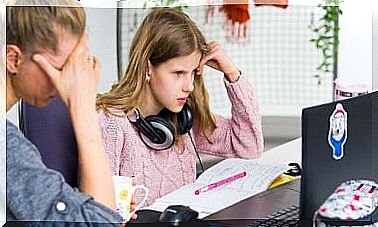Parents’ Bad Mood Can Affect A Child’s Emotional Development

The emotional balance of parents plays a key role in a child’s development. The constant bad mood of the parent negatively affects the child both emotionally and cognitively.
It is important for a parent to maintain a balanced emotional life and be careful not to be in a bad mood at all times to protect their child’s emotional well-being.
Irritated parents are a serious problem for children
Poor parental mood can adversely affect children’s emotional development. This is especially true if the parent is in a bad mood all the time or often.
The child experiences feelings of insecurity if he or other family members are shouted. Sometimes it can also make a child feel guilty.
Children 0-3 years of age are particularly sensitive to parental emotional imbalance. However, this does not mean that it would not be detrimental to older children as well.
It is very important that parents are always aware of their own behavior when children are present and try to control their emotions. This recommendation is not only good for the parent’s own mental health, but for the whole family.

Why are parents angry and irritable?
There can be many reasons for parental tension. Many parents carry with them the ballast of the past, which requires professional help to resolve.
Sometimes, on the other hand, parents are stressed, for example, by work or financial matters. If so, you should look for ways to help dissipate negative energy. If a parent is unable to control their negative emotions, it is a good idea to consult an expert.
It is important to identify what is causing the problem and try your best to fix it. This will help protect the people around you – especially your children.
How does parental bad mood affect a child?
Insecurity
This is one of the key ways in which parental bad moods affect children. If the atmosphere is constantly tense and stressful, the child will feel insecure.
This is especially true if the tension and stress are related to the child’s parents. This same feeling of insecurity can turn into an experience of guilt.
Depression and anxiety
Insecurity brings with it depression and anxiety. Children who are often exposed to parental bad moods often have difficulty adjusting to school. They may also find it difficult to get along with other children their age.
A child’s school success can also suffer, as can a child’s relationship with a parent. The child may be afraid to express themselves in the presence of a parent, which can lead to a wide range of short- and long-term emotional conflicts.
Aggressive behavior
If the parents are constantly in a bad mood, the child may interpret this attachment as lacking. Such an interpretation is particularly damaging, as it can seriously affect a child’s development.
Children whose relationship with their parents is cool and distant often behave aggressively and exhibit obvious anxiety symptoms.
How can parents avoid bad winds?
Depending on the severity of the situation, it is worth considering obtaining professional help. However, if the problem is mild, the suggestions below may be helpful.
Take time for yourself
One of the most important things for maintaining optimal emotional well-being is taking time for yourself. Book yourself an hour of moving around, reading, or meeting your friends. All of these habits help relieve accumulated stress.

Invest in communication
An effective way to avoid stressful situations is to make sure you communicate openly and effectively with your loved ones. Respect and the ability to express personal opinions help keep stress levels low. They also help you take care of your mental and emotional well-being.
Admit the problem
If you don’t admit the problem, you will never find a solution. The only way you can face the problem and make a change is to admit that something needs to change.
It is also important that you reassure your child that your bad wind is not his fault. Once again, communication is a key factor in protecting your other family members from the effects of your mood.
Poor mood of parents can adversely affect a child’s emotional and cognitive development. Acknowledge that the problem exists and think about how you will face it and make the necessary changes. This is the beginning of a new better relationship with both yourself and those around you.









